
Guests
- Jeremy CorbynBritish member of Parliament who served as leader of the Labour Party and leader of the opposition from 2015 to 2020.
We get reaction to the Taliban takeover in Afghanistan from British member of Parliament and former Labour Party leader Jeremy Corbyn, one of the leading critics of the Afghan War in Britain. He says critics who warned against invading Afghanistan, and later Iraq, have been vindicated, and calls for an official inquiry into the war. “It’s horrible to read back to 2001 and 2003 and say all the worst predictions that any of us ever made have all come to pass,” Corbyn tells Democracy Now!
Transcript
AMY GOODMAN: This is Democracy Now!, democracynow.org, The War and Peace Report. I’m Amy Goodman, with Nermeen Shaikh.
As we continue to look at the crisis in Afghanistan, we turn now to one of the leading British critics of the U.S. war: former Labour Party leader Jeremy Corbyn. In 2001, he helped form the Stop the War Coalition to campaign against the U.S. invasion. This is Corbyn in October 2001 questioning then-Prime Minister Tony Blair in the British Parliament, two weeks after the U.S. invaded Afghanistan.
JEREMY CORBYN: Does the prime minister not recognize that the continued bombing campaign, including the use of cluster bombs, in Afghanistan is forcing large numbers of people to seek refuge in Pakistan, that it’s bringing devastation and poverty to the people of Afghanistan, and it seems to be directed, in part, against conscripted soldiers and against civilian targets? Does he not accept the call of the aid agencies last week for a halt in the bombing to allow the humanitarian aid to get in, rather than more death and more destruction?
PRIME MINISTER TONY BLAIR: Mr. Speaker, I just answered, a moment or two ago, about the humanitarian program, and I drew attention to comments of spokespeople for the World Food Programme that it is not the bombing that is preventing the food getting through. In respect of the campaign itself, there are no civilian targets at all. We do everything we can, unlike bin Laden and the al-Qaeda network, who set out to kill as many civilians as they possibly could — we do everything we can to minimize civilian casualties.
But, as I was saying earlier today, there is a simple choice in this respect. We either decide, after an atrocity like the 11th of September, that we are going to act against those responsible, against those sheltering those who are responsible, or we don’t. And I can’t see, in the light of that atrocity, the fact that we know that that network of terror intends committing further such atrocities, how we could possibly stand back and do nothing in those circumstances. So, I respect entirely his right to disagree with the course that we are taking, but I believe that course to be right.
AMY GOODMAN: So, that was Tony Blair responding to Jeremy Corbyn just after the U.S. invaded Afghanistan. Corbyn would go on to serve as Labour Party leader in Britain from 2015 to 2020, during which time he continued to be a leading antiwar voice in Parliament. He’s joining us now from Greece.
To continue the debate, Jeremy Corbyn, if you could respond to Blair, the former British prime minister, blasting Biden recently, saying the U.S.'s withdrawal of troops from Afghanistan is “imbecilic,” saying the move has “every jihadist group round the world celebrating”? Your response to what's happening now and what has happened over this 20 years?
JEREMY CORBYN: I was simply saying to Tony Blair, and to George Bush, “You took us into a war that made no sense whatsoever in 2001. You exacerbated the problems there. You created the poverty there. You created the poppy production.” The only people that have benefited from all of this have been the world’s arms dealers and the real estate of Middle Eastern cities, particularly Dubai and other places. The corruption, as Sarah pointed out, is rife in Afghanistan. And we are now reaping that whirlwind.
But I think we also have to look at this in the slightly longer historical context. It was the obsessions of Cold War politics of the 1970s that encouraged the U.S. to fund the mujahideen, which eventually formed into the Taliban, working with Pakistan, because they felt they had to oppose what they believed to be the Soviet continued occupation of Afghanistan. The Soviet Union was driven out by those forces. And then 9/11 happened. They decided that the whole purpose of 9/11 had come from Afghanistan, rather than that bin Laden had gone back there — and, in fact, he was found in Pakistan anyway eventually. And we’ve then been involved now in 20 years of war.
Two years after the invasion of Afghanistan in 2001, we had the absurdity of the Iraq War, in which Bush and Blair claimed that Iraq was both harboring ISIS and was also developing weapons of mass destruction, neither of which were true. There were very few of us in the British Parliament who consistently spoke up against the human rights abuses in Iraq before 2003. I was one of those. We went into that war in 2003, and we warned that this would create the wars of tomorrow, the terrorism of tomorrow, the poverty of tomorrow and the refugees of tomorrow. It’s horrible to read back to 2001 and 2003 and say all the worst predictions that any of us ever made have all come to pass.
I was on a call last night with the U.K. defense secretary. A lot of MPs were on that call. And we were making desperate pleas on behalf of individual people from the communities that we represent. I have Afghan people living in my community. They have family back in Kabul, in Kandahar and other places, and they’re trying to get out to get to a place of safety.
We’ve just created this terrible situation. And it’s now a question of, one, making sure that those people that are most at risk are brought out safely; secondly, that the food problem, the aid problem, is dealt with very rapidly; and what kind of engagement there’s going to be with any government that’s formed in Kabul in the future, because if there isn’t some form of engagement, there isn’t some form of recognition and some huge pressure on human rights, on women’s rights and all the other issues, then I fear yet another conflict will break out in Afghanistan. It is a terrible situation.
NERMEEN SHAIKH: And, Jeremy Corbyn, you’ve called on Prime Minister Johnson to start an inquiry into the Afghan War. Could you explain what you want that inquiry to include?
JEREMY CORBYN: After the Iraq War had started, many of us continually asked for an inquiry into the way the decisions were made. And eventually, after three or four attempts, there were various parliamentary inquiries and so on. Sir John Chilcot’s inquiry was set up, and he produced a huge and very lengthy report which indicated the inefficiency of decision-making, the way in which the intelligence reports had been messed about with and the inaccuracies of many of the decisions that were made. And as leader of the party, I formally apologized for Labour’s role in promoting the Iraq War.
I think we did exactly the same over Afghanistan — what decisions were made at the very beginning, why so many British troops went in, why Britain accepted the role of being the custodian of Helmand province, with the loss of hundreds of British soldiers in that particular conflict, and what has happened to the vast amounts of aid that Britain and other countries have sent to Afghanistan. I’ve met soldiers that have came back from Afghanistan. Indeed, quite a number have — or, in fact, a small number are now members of the British Parliament, and they’ve described what the situation was like there. And Clive Lewis, in particular, a Labour MP, is very concerned that we might be about to make the same kind of mistakes again in the future.
And so, I think an inquiry needs to take place, because those that have lost loved ones in Afghanistan, soldiers — British, American, German, Afghan, many, many others — all the thousands of lives that have been lost, their loved ones, their families need to know: Did that person die in vain? Was this necessary? Could this have been avoided? Otherwise, we’re just going to march into one war after another. And the only beneficiaries are those that are either after the mineral riches of Afghanistan — and they are huge, as even the Russians indicated in the 19th century — or it’s going too be the arms dealers, that do very well out of it.
NERMEEN SHAIKH: Jeremy Corbyn, you talked about your own constituents whose family members are Afghan Brits, whose families are still in Kabul. What do you think the U.K. government can do to allow refugees safe access to the U.K., I mean, given the scenes at the Kabul airport, and also the fact that when Prime Minister Johnson was the mayor of London, he actually advocated for giving undocumented people residence in the city?
JEREMY CORBYN: Yes, Boris Johnson’s politics are a wonder to observe. I remember him contacting me, when he was mayor of London, asking me to support his campaign that undocumented refugees should be given right of permanent residence and eventually citizenship in Britain. I agreed. I supported it. I supported it then, and I support it now. He then went on to become prime minister and has led a horrible campaign against refugees, and his government is now trying to push through Parliament a piece of legislation that will make it a criminal offense — a criminal offense — to assist a refugee at sea in getting to safety at shore, contrary to the international law of the sea.
Now, as to the British people in Afghanistan or the Afghan families who have a family member in Britain, or some who have British passports and are in Afghanistan, they’re obviously all entitled to come out. And the RAF has been doing its best to get people out, and quite a lot have got out. But not everybody has got out. There is chaos around the airport, as everyone can observe at the present time. And it is a desperate argument that’s going on: Who has got the greater priority, this person or that person?
Fortunately, the government has relaxed quite a lot of the rules on entry to Britain. In other words, biometric tests are no longer required. And it appears to be that if one family member has a right to enter Britain through holding of a U.K. passport, then the rest of the family can come, as well. But they’re not all going to get out through Kabul airport. There is no other, as I understand it, international airport in Afghanistan that works or people could get to, anyway. Or they’ve got to try and get across the border into Tajikistan, into Iran, into Pakistan, or wherever else. It is a humanitarian crisis.
But, interestingly, the U.S. sent the director of the CIA, it is reported, to Kabul to discuss matters with the Taliban. It seems that we’re now having, through the U.S. and, presumably, through other countries, as well, direct negotiations with the Taliban in Afghanistan. There has been a contact point for a long time in Qatar. Surely, all this could and should have been done years ago, and all the lives that could have been saved and all the misery that has happened since then could have been reduced, if not completely avoided. Surely, there’s a huge lesson for us all here. But, obviously, the priority at this very moment is to bring safety to those most vulnerable people in Afghanistan from the excesses of what the Taliban have done in the past, and —
AMY GOODMAN: Jeremy Corbyn, we’re going to have to leave it —
JEREMY CORBYN: — there are reports of doing on the ground [inaudible] — I’m sorry.
AMY GOODMAN: We’re going to have to leave it there, but we thank you so much for being with us, former British Labour leader, one of the leading critics of the Afghan War in Britain from the beginning. And that does it for our show. I’m Amy Goodman, with Nermeen Shaikh. Stay safe.


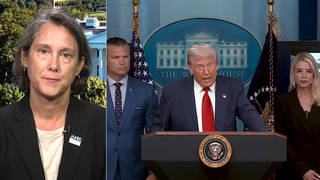
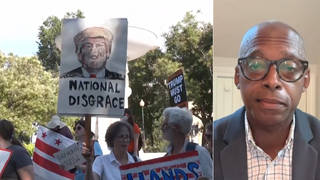
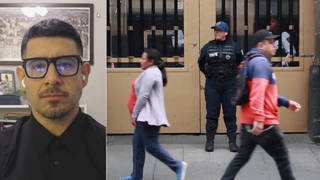





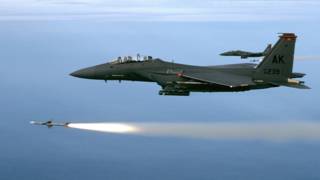

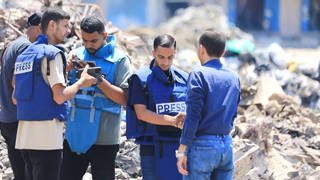
Media Options